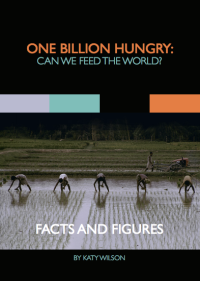
Photo by Danilo Rizzuti
Now going for close to four years, this blog began as a platform to allow us to continually update and review the content of One Billion Hungry: Can we feed the world? Between the publication of The Doubly Green Revolution and One Billion Hungry, the agricultural development and environmental landscape had changed so much that it was important to find a way to remain relevant in order to help to bring about the changes needed for a food secure world. As such we like to periodically bring you a selection of up-to-date, interesting and thought-provoking books and resources, and here are our picks for early 2016. If you know of any interesting or pertinent books or other materials we’d love to hear your suggestions.
Books
Otsuka, K. and Larson, D.F. (Eds.) 2016. In Pursuit of an African Green Revolution. Views from Rice and Maize Farmers’ Fields. Springer.
This book explores recent experiences in trying to bring about a Green Revolution in Sub-Saharan Africa (SSA), focussing on rice and maize. Authors find that an African Rice Revolution has already begun in many irrigated areas, using Asian-type modern varieties, chemical fertilizer, and improved management practices. The same technological package significantly increases the productivity and profitability of rice farming in rainfed areas as well. By strengthening extension capacity and providing management training to smallholders, African governments can boost productivity and accelerate the pace of Africa’s Rice Revolution. The story for maize is quite different, however, where most farmers use local varieties, apply little chemical fertilizer, and obtain very low yields, and thus the success of Africa’s Maize Revolution will require a different approach based on hybrid maize, chemical and organic fertilizers, and stall-fed cross-bred cows.
Moseley, W.G., Schnurr, M.A. and Bezner-Kerr, R. (Eds.) 2016. Africa’s Green Revolution: Critical Perspectives on New Agricultural Technologies and Systems. Routledge.
This book examines the dominant neoliberal agenda for agricultural development and hunger alleviation in Africa. Authors review the history of African agricultural and food security policy in the post-colonial period, across a range of geographical contexts, in order to contextualise the productionist approach embedded in the much heralded New Green Revolution for Africa. This strategy, supported by a range of international agencies, promotes the use of hybrid seeds, fertilisers, and pesticides to boost crop production. This approach is underpinned by a new and unprecedented level of public–private partnerships as donors actively work to promote the private sector and build links between African farmers, input suppliers, agro-dealers, agro-processors, and retailers. The chapters in this volume raise serious questions about its effectiveness as a strategy for increasing food production and alleviating poverty across the continent.
Brautigam, D. 2016. Will Africa Feed China? OUP USA
Over the past decade, China’s meteoric rise on the continent has raised a drumbeat of alarm. China has 9 percent of the world’s arable land, 6 percent of its water, and over 20 percent of its people. Africa’s savannahs and river basins host the planet’s largest expanses of underutilized land and water. Few topics are as controversial and emotionally charged as the belief that the Chinese government is aggressively buying up huge tracts of prime African land to grow food to ship back to China. In Will Africa Feed China?, Deborah Brautigam, one of the world’s leading experts on China and Africa, probes the myths and realities behind the media headlines. Her careful research challenges the conventional wisdom; as she shows, Chinese farming investments are in fact surprisingly limited, and land acquisitions modest. Defying expectations, China actually exports more food to Africa than it imports. But is this picture likely to change?
Lumumba-Kasongo, T. (Ed.) 2015. Land Reforms and Natural Resource Conflicts in Africa: New Development Paradigms in the Era of Global Liberalization. Routledge.
This book is a critical examination of the place and role of land in Africa, the role of land in political formation and national identification, and the land as an economic resource within both national economic development and liberal globalization. Colonial and post-colonial conflicts have been rooted in four related claims: the struggle over scarce resources, especially access to land resources; abundance of natural resources mismanaged or appropriated by both the states, local power systems and multinationals; weak or absent articulated land tenure policies, leading to speculation or hybrid policy framework; and the imperatives of the global liberalization based on the free market principles to regulate the land question and mineral appropriation issue. The actualization of these combined claims have led to conflicts among ethnic groups or between them and governments. This book is not only about conflicts, but also about local policy achievements that have been produced on the land question. It provides a critical understanding of the forces and claims related to land tenure systems, as part of the state policy and its system of governance. [Read more…]











